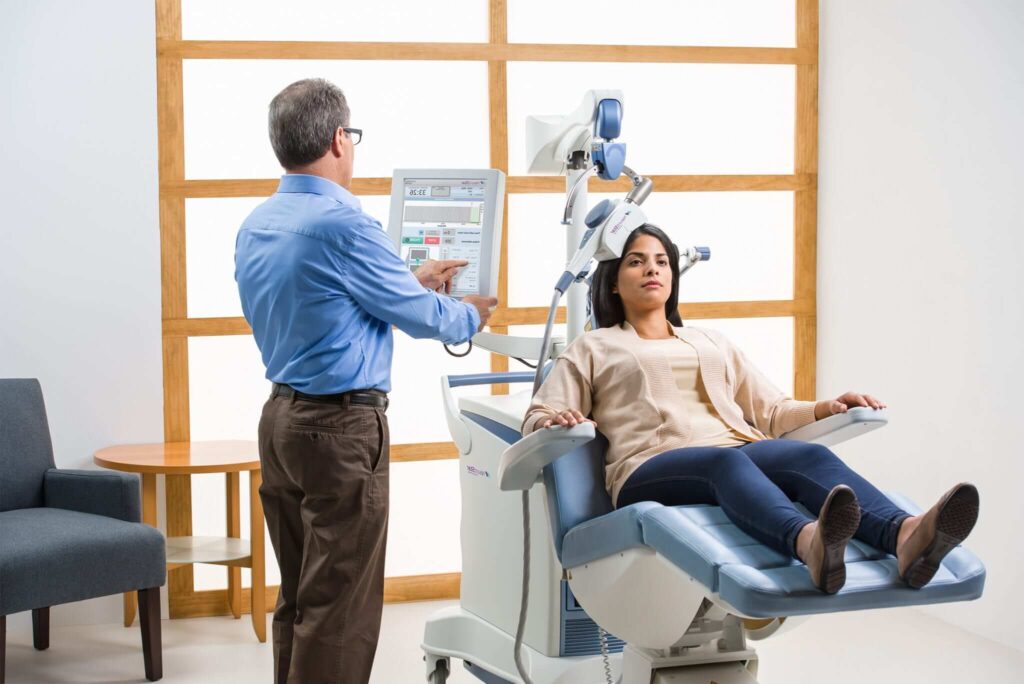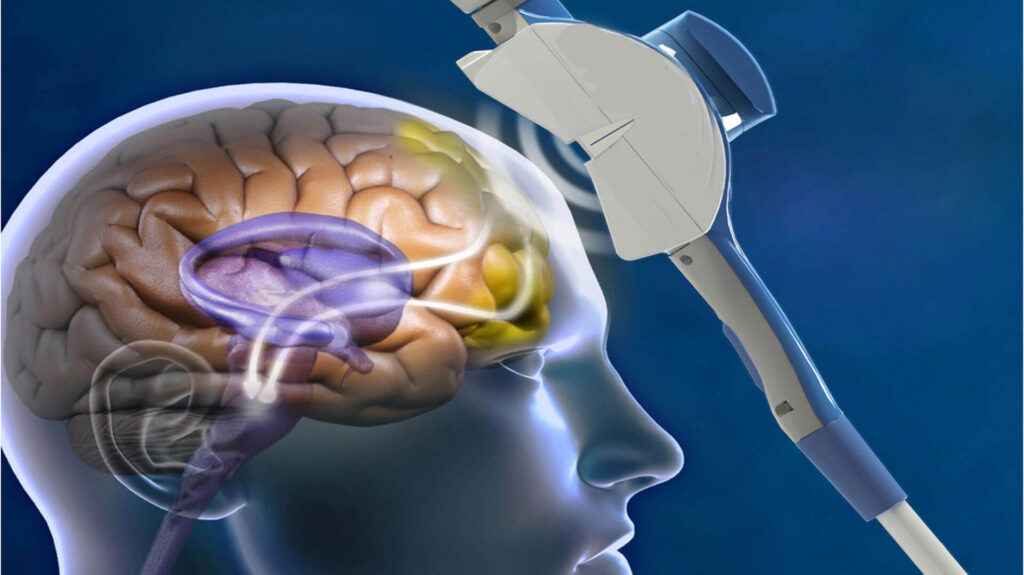Imagine a treatment that can alleviate the symptoms of major depression without the need for invasive surgery or medication. Transcranial Magnetic Stimulation (TMS) is a groundbreaking, non-invasive procedure that uses magnetic fields to stimulate nerve cells in the brain, offering hope to those who have not found relief through traditional therapies.
This innovative therapy has been shown to improve mood, enhance cognitive function, and provide a new lease on life for many individuals. Discover how TMS can transform your mental health journey and help you reclaim your well-being. Continue reading to learn more about the science behind TMS and the incredible benefits it can offer.


TMS is a non-invasive procedure that applies magnetic fields to some areas of the brain which are responsible for specific conditions to cause stimulation of the nerve cells.
It’s like a remote control of the brain, but instead of changing channels, it changes neural activity.
rTMS is the most common form of TMS used in therapy. It delivers those magnetic pulses repeatedly over a series of sessions and involves the cortex part of the brain.
When we put the coil on your head, you hear a subtle noise (like a fast ticking clock) and the exact mechanisms of action behind TMS or rTMS are not fully understood, but neuroimaging like EEG, QEEG and fMRI show that rTMS leads to functional changes.
Imagine the magnetic pulses as small mail carriers, bringing messages between neurons by stimulating the release of neurotransmitters, the brain’s chemical messengers. TMS may help to make up for any deficit in these neurotransmitters, leading to improved mood and reduced anxiety. So we have some biochemical effects here.
Another intriguing hypothesis suggests that rTMS can impact the motor cortex’s ability to control neural circuits, measured by the strength and length of muscle responses.
Notice that TMS can treat disorders that haven’t responded to medication or other therapies. Think of it as a lifeline for those who haven’t found relief with traditional methods.
That’s a big question, and the honest answer is: that researchers are still figuring it out. TMS is a relatively new therapy, and research is ongoing. However, it’s showing promise for individuals with the conditions above.
It’s important to remember that TMS is not right for everyone, and your doctor can best advise you.
While generally safe, TMS is not suitable for everyone. Some people aren’t allowed to be treated by TMS:
With over 38 million strong, Canada holds a considerable population, hence varied mental health needs. According to The Canadian Mental Health Association (CMHA), approximately one in five Canadians will get a mental health problem in any year. Now, access to quality mental health care can be a challenge, especially in rural areas. This is where TMS holds promise: since it is non-invasive and doesn’t require protracted hospital stays, it could be delivered in more varied settings, making it more accessible to Canadians across the vast geography.
The good news is that research shows that TMS is effective for treating depression, anxiety, and OCD. Studies in the last 25 years, document that some patients have improved significantly (around 50-60% of clients) after TMS treatment (we call it the acute effect of TMS). The effects of the treatment may not be immediate but often become evident throughout treatment (scientists consider this as a prolonged effect). The important thing to remember is that TMS does not work in one size fits all. Some people improve enormously, and others, it affords modest benefits. However, through assessment and check-ups during treatment, we make sure that you will get the most result out of it.
If you want to learn more about TMS and its effectiveness for yourself, the first step is to seek help from our team of experts. They can assess whether you’re a good candidate for the treatment and help you navigate the process. Also, you should consider:
As mentioned earlier, TMS is most effective these days in treating treatment-resistant depression, anxiety, and OCD.
Certain medical conditions might make TMS unsafe like pregnancy or epilepsy.
TMS is not a quick fix, and results will vary.
Be prepared for a series of treatment sessions.
While generally well tolerated, some clients may experience mild, transitory side effects with TMS, such as headaches, discomfort in the scalp, and short-term light-headedness after the first few sessions. These generally resolve within a few treatments.
Here we can let you know what happens during an actual TMS session:
You will be seated in a chair, pretty much like you would when you see your dentist. A technician places a flat surface on your head with the magnetic coil inside.
The coil sends brief magnetic pulses to specific areas of your brain. The pulses feel like light tapping sensations—not too uncomfortable. Sessions usually take anywhere from 10-20 minutes.
After it’s done, you can get up and engage with your life just like any other day. Immediately after your session, you can drive back home or even join an online meeting with full attention. Its effects may not be felt suddenly, but some experience improvements in mood or reduced anxiety within a few treatments, while others might take a little longer.
TMS is generally a multi-session treatment course, normally carried out over three to five weeks. Think of it like building muscle—consistency is key. The exact number of sessions depends on individual needs and the condition meant to treat. After assessment, you will be given a treatment plan including the protocol, number of sessions and all you need to know about your TMS treatment.
The world of mental health care in Canada is constantly evolving, and TMS is a significant player in this evolution. Also, the potential of this non-invasive treatment is undeniable. If you're struggling with a mental health condition and haven't found relief with traditional methods, contact us.
No. Because of precautionary reasons, TMS is generally avoided during pregnancy and breastfeeding. The long-term effects of TMS on a developing fetus or breastfed baby are still unknown. If you're pregnant or breastfeeding and struggling with mental health concerns, consult your doctor about alternative treatment options.
TMS can be a viable option for older adults experiencing some conditions that might respond to TMS. In fact, some studies suggest that older adults might tolerate TMS even better than younger patients. However, a thorough medical evaluation by a doctor is crucial to ensure TMS is safe for you. You can discuss this with our clinicians through the assessment.
The use of TMS in children and teenagers is still under investigation. While TMS shows promises for treating depression in adults, more research is required to determine its safety and effectiveness in younger populations. Their developing brains might react differently to TMS compared to adults. At the Different Clinic, we provide TMS to people aged 16 to 65 years old.
Yes. TMS is approved by Health Canada for adults are dealing with depression, anxiety, and OCD and recommended to people who haven’t found relief with medication or other therapies. The FDA (Food and Drug Administration) in the United States has also approved TMS for treating MDD in adults.
No. Because of precautionary reasons, TMS is generally avoided during pregnancy and breastfeeding. The long-term effects of TMS on a developing fetus or breastfed baby are still unknown. If you're pregnant or breastfeeding and struggling with mental health concerns, consult your doctor about alternative treatment options.
TMS can be a viable option for older adults experiencing some conditions that might respond to TMS. In fact, some studies suggest that older adults might tolerate TMS even better than younger patients. However, a thorough medical evaluation by a doctor is crucial to ensure TMS is safe for you. You can discuss this with our clinicians through the assessment.
The use of TMS in children and teenagers is still under investigation. While TMS shows promises for treating depression in adults, more research is required to determine its safety and effectiveness in younger populations. Their developing brains might react differently to TMS compared to adults. At the Different Clinic, we provide TMS to people aged 16 to 65 years old.
Yes. TMS is approved by Health Canada for adults are dealing with depression, anxiety, and OCD and recommended to people who haven’t found relief with medication or other therapies. The FDA (Food and Drug Administration) in the United States has also approved TMS for treating MDD in adults.
References:
4711 Yonge St., 10th Floor, Unit 10097, Toronto, ON M2N 6K8
Monday to Friday 8:00 AM to 8:00 PM / Weekends: Saturday from 10:00 AM to 6:00 PM.

